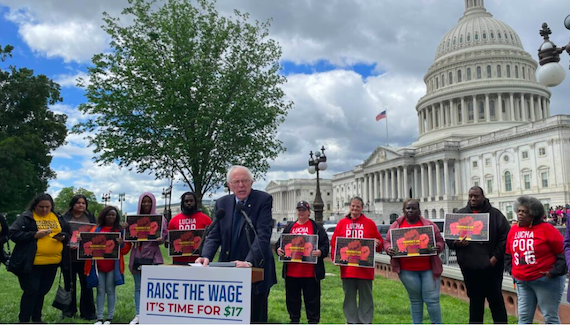Outside the U.S. Capitol, Sanders, a Vermont independent and chairman of the Health, Education, Labor and Pensions Committee, said the panel will vote June 14 on a bill that would increase the federal minimum wage of $7.25 an hour to $17 an hour over a five-year period.
That goal is a $2-an-hour increase from labor organizers’ past campaign of “Fight for $15.”
“Frankly, it is embarrassing for us to be here today and have to talk about a reality where people need to work two or three jobs to put food on the table for the kids,” Sanders said, surrounded by advocates for a higher minimum wage. “You have billionaires who don’t know what to do with their money, buying yachts and going off into outer space, so the time is long overdue.”
Sanders argued that the idea is popular regardless of party affiliation and cited Nebraska, a deep red state that approved an increase in the state minimum wage to $15 an hour, and Florida, which leans red but has also passed an increase in its minimum wage to $15 an hour by 2026.
He said the U.S. Senate “is going to push it as quickly and hard as we can,” but did not specify if it would be brought to the Senate floor for a vote. There is also the hurdle of the 60-vote threshold when Democrats have a slim 50-seat majority.

Thursday, U.S. Sen. Bernie Sanders said on June 14 Congress will vote on a bill that would increase the federal minimum wage of $7.25 an hour to $17 an hour over a five-year period. (Screenshot courtesy of C-SPAN)
And with a Republican-controlled House, it’s unlikely to be brought up by House Speaker Kevin McCarthy, a California Republican.
Heidi Shierholz, the president of the left-leaning Economic Policy Institute, said at the press conference that the economic impact of an increase to the federal minimum wage is one of the most-studied subjects in economics.
“The weight of that evidence shows that (when the) minimum wage increases, they raise the wages of our lowest wage-workers, they reduce inequality, they reduce poverty, they reduce child poverty, they reduce gender wage gaps, they reduce racial wage gaps because Black and brown workers, due to the broad impacts of structural racism on our labor markets, are disproportionately concentrated in the lowest-wage jobs,” Shierholz said.
Workers in the South
Economic researchers have found that an increase to the federal minimum wage would particularly benefit low-income workers in the South.
A report from the nonpartisan Congressional Budget Office found that a boost to a $15-an-hour wage by 2025 would nearly lift a million people out of poverty and more than 17 million workers would experience a wage increase by 2025.
Shierholz said because of inflation, a $15 minimum wage isn’t sufficient.
“So just to give you an idea, $17 today has roughly the same purchasing power as $15 did just two years ago,” she said.
A 40-hour work week with a minimum wage of $15 an hour comes out to an annual salary of about $31,000, before taxes. That is just above the poverty line for a family of four, which is $30,000. A 40-hour work week of $17 an hour would come out to an annual salary of about $35,000 before taxes.
“Mama Cookie” Bradley, a longtime labor organizer from Durham, North Carolina, who attended the press conference, said that a $17-an-hour wage in her city would mean residents would be able to afford rent, food and child care costs.
“It would make life a lot more easier,” she said.
Bradley said she’s fighting for an increase in the federal minimum wage not only for herself, but for the next generation.
“They need it,” she said, adding that her advice for the younger generation is to “keep fighting, keep unionizing and keep organizing.”
The last time the federal minimum wage was raised was in 2009, to $7.25 an hour. Efforts to increase the federal minimum wage have stalled several times in Congress.
When Democrats held control in both chambers in 2021 they tried to include a gradual increase of the federal minimum wage in the $1.9 trillion COVID-19 relief package through a process known as reconciliation that requires only a simple majority, but not all Senate Democrats were on board.
The Biden administration issued an executive order in April 2021 to raise the minimum wage for federal contract workers to $15 an hour, which includes nursing assistants at Veterans Administration hospitals, maintenance workers, cleaning staff and food service workers.



 © 2025 All Rights Reserved
© 2025 All Rights Reserved